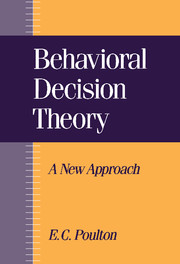Book contents
- Frontmatter
- Acknowledgments
- Contents
- Preface
- Chapter 1 Outline of heuristics and biases
- Chapter 2 Practical techniques
- Chapter 3 Apparent overconfidence
- Chapter 4 Hindsight bias
- Chapter 5 Small sample fallacy
- Chapter 6 Conjunction fallacy
- Chapter 7 Regression fallacy
- Chapter 8 Base rate neglect
- Chapter 9 Availability and simulation fallacies
- Chapter 10 Anchoring and adjustment biases
- Chapter 11 Expected utility fallacy
- Chapter 12 Bias by frames
- Chapter 13 Simple biases accompanying complex biases
- Chapter 14 Problem questions
- Chapter 15 Training
- Chapter 16 Overview
- References
- Index
Chapter 11 - Expected utility fallacy
Published online by Cambridge University Press: 06 July 2010
- Frontmatter
- Acknowledgments
- Contents
- Preface
- Chapter 1 Outline of heuristics and biases
- Chapter 2 Practical techniques
- Chapter 3 Apparent overconfidence
- Chapter 4 Hindsight bias
- Chapter 5 Small sample fallacy
- Chapter 6 Conjunction fallacy
- Chapter 7 Regression fallacy
- Chapter 8 Base rate neglect
- Chapter 9 Availability and simulation fallacies
- Chapter 10 Anchoring and adjustment biases
- Chapter 11 Expected utility fallacy
- Chapter 12 Bias by frames
- Chapter 13 Simple biases accompanying complex biases
- Chapter 14 Problem questions
- Chapter 15 Training
- Chapter 16 Overview
- References
- Index
Summary
Summary
The normative theory of expected utility predicts that people should choose the largest expected gain or smallest expected loss. In choosing between 2 options with the same expected gain or loss, people should choose each option about equally offen. People who do not follow the normative theory can be said to commit the expected utility fallacy. Most people commit the fallacy when choosing between 2 options with the same moderate expected gain or loss. They prefer a high probability gain but a low probability loss. With very low probabilities the preferences reverse. Most people buy a lottery ticket that offers a very low probability gain. They buy insurance to avoid a very low probability loss. Also following the response contraction bias, large gains and losses are undervalued when compared with small gains or losses. Losses matter more than gains.
Prospect theory describes the choices that people actually make. The theory accounts for the preferences just described by postulating a non-linear response contraction bias to convert probabilities to decision weights, and another nonlinear response contraction bias to convert gains and losses to positive and negative subjective values. Multiplying the subjective values by the decision weights produces prospects that should match the preferences.
However, neither expected utility theory nor prospect theory will account for all the majority choices when gains and losses are intermixed in the same investigation. Pricing options can reverse the preferences between pairs of options, owing to the sequential contraction bias that pricing encourages.
- Type
- Chapter
- Information
- Behavioral Decision TheoryA New Approach, pp. 194 - 219Publisher: Cambridge University PressPrint publication year: 1994



